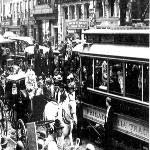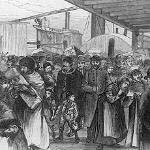
Welcome to THE MAKING OF A NATION -- American history in VOA Special English.
In our last program, we told you the story of the Statue of Liberty. It was given to the United States by the people of France. Lady Liberty holds a bright torch high over the harbor of New York City. Millions of immigrants coming to America passed the statue as ships carried them to the immigration processing center on Ellis Island.
This week in our series, Leo Scully and Maurice Joyce tell the story of immigration in the United States during the 1800s.
LEO SCULLY: American life was changing. And it was changing quickly. Before 1860, the United States had an agricultural economy. After 1860, the country began to change from an agricultural to an industrial economy.
In 1860, American shops and factories produced less than 2,000 million dollars' worth of goods. Thirty years later, in 1890, American factories produced 10,000 million dollars' worth. By then, more than five million persons were working in factories and mines. Another three million had jobs in the building industries and transportation.
MAURICE JOYCE: Year after year, production continued to increase. And the size of the industrial labor force continued to grow.
A great many of the new industrial workers came from American farms. Farm work was hard, and the pay was low. Young men left the family farms as soon as they could. They went to towns and cities to look for an easier and better way of life. Many of them found it in the factories. A young man who worked hard and learned new skills could rise quickly to better and better jobs.
This was not only true for farmers, but also for immigrants who came to the United States from foreign countries. They came from many different lands and for many different reasons. But all came with the same hope for a better life in a new world.
LEO SCULLY: In the 1850s, America's industrial revolution was just beginning. Factories needed skilled workers -- men who knew how to do all the necessary jobs. Factory owners offered high pay to workers who had these skills.
British workers had them. Many had spent years in British factories. Pay was poor in Britain, and these skilled workers could get much more money in America. So, many of them came. Hundreds of thousands. Some factories -- even some industries -- seemed completely British.
MAURICE JOYCE: Cloth factories in Fall River, Massachusetts, were filled with young men from Lancashire, England. Most of the workers in the shipyards of San Francisco were from Scotland. Many of the coal miners in America were men from the British mines in Wales.
Many were farmers who came to America because they could get land for nothing. They could build new farms for themselves in the rich land of the American west.
LEO SCULLY: One of the best-liked songs in Britain then was a song about the better life in America. Its name: "To The West." Its words helped many men decide to make the move to America.
"To the West, to the West, to the land of the free
Where mighty Missouri rolls down to the sea;
Where a man is a man if he's willing to toil.
And the poorest may harvest the fruits of the soil.
Where the young may exult and the aged may rest,
Away, far away, to the land of the west."
MAURICE JOYCE: To another group of immigrants, America was the last hope. Ireland in the 1840s suffered one crop failure after another. Hungry men had to leave. In 1850 alone, more than 117,000 people came to the United States from Ireland. Most had no money and little education. To those men and women, America was a magic name.
LEO SCULLY: Throughout Europe, when times were hard, people talked of going to America. In some countries, organizations were formed to help people emigrate to the United States. A Polish farmer wrote to such an organization in Warsaw:
"I want to go to America. But I have no money. I have nothing but the ten fingers of my hands, a wife, and nine children. I have no work at all, although I am strong and healthy and only 45 years old. I have been to many towns and cities in Poland, wherever I could go. Nowhere could I earn much money. I wish to work. But what can I do. I will not steal, and I have no work. So, I beg you to accept me for a journey to America."

MAURICE JOYCE: As the years passed, fewer people were moving to America for a better job. Most were coming now for any job at all. Work was hard to find in any of the cities in Europe.
A British lawmaker told parliament in 1870 that Englishmen were leaving their country, not because they wanted to, but because they had to. They could not find work at home. He said that even as he spoke, hundreds were dying of hunger in London and other British cities. They were victims of the new revolution in agriculture and industry.
Small family farms were disappearing. In their places rose large modern farms that could produce much more. New machines took the place of men. And millions of farmers had to look for other work. Some found it in the factories. Industry was growing quickly -- but not quickly enough to give jobs to all the farmers out of work.
LEO SCULLY: In the next ten years, millions of people made the move from Britain, Germany, and the Scandinavian countries. But then, as industry in those countries grew larger, and more jobs opened, the flood of immigration began to slow.
The immigrants now were coming from southern and eastern Europe. Anti-Jewish feeling swept Russia and Poland. Violence against Jews caused many of them to move to America.
In the late 1880s, cholera spread through much of southern Italy. Fear of the disease led many families to leave for the United States.
Others left when their governments began building up strong armies. Young men who did not want to be soldiers often escaped by moving to America. Big armies were costly, and many people left because they did not want to pay the high taxes.
Whatever the reason, people continued to emigrate to the United States.
MAURICE JOYCE: These new immigrants were not like those who came earlier. These new immigrants had no skills. Most were unable to read or write.
Factory owners found that these eastern and southern Europeans were hard workers. They did not protest because the work was hard and the pay was low. They did not demand better working conditions. They did not join unions or strike.
Factory owners began to replace higher-paid American and British workers with the new immigrants. Business leaders wanted more of the new workers. They urged the immigrants to write letters to their friends and relatives in the old country. "Tell them to come to America, that there are plenty of jobs."
LEO SCULLY: Letters from America brought many more immigrants. The big steamship companies also helped industry to get more of the new workers. They paid thousands of agents throughout Europe to sell tickets for the trip to America. Their efforts meant that steamships bringing grain to Europe could return to America filled with immigrants.
They came by the hundreds of thousands. People of all religions, from all across Europe. Many remained in New York and other eastern cities. But many others moved westward. They took jobs in the steel factories of Pennsylvania and the coal mines of West Virginia. They worked in the lumber camps of Michigan and in the stockyards and meat-packing plants of Chicago.
MAURICE JOYCE: Within a few years, foreign-born workers held most of the unskilled jobs in many American industries. American workers began to protest. They demanded an end to the flood of immigration.
That will be our story in the next program of THE MAKING OF A NATION.
(MUSIC)
BARBARA KLEIN: Our program was written by Frank Beardsley. The narrators were Leo Scully and Maurice Joyce. You can find our series online with transcripts, MP3s, podcasts and images at voaspecialenglish.com. You can also follow us on Facebook and Twitter at VOA Learning English. Join us again next week for THE MAKING OF A NATION -- an American history series in VOA Special English.
American history: labor unrest marks Cleveland’s first term
American history: Chester Arthur's term marked by disputes within his party
American history series: Garfield's short presidency ends in tragedy
American history: settlers rush to claim western land
American history: Custer's last stand against the Indians
American history series: Indian wars
American history: songs cowboys sung
American history: gold, land drive settlers West
President Hayes promises only one term in office
Hayes wins hotly disputed 1876 election
Grant’s second term worse than first
American history series: Grant's political battles
American history series: the election of 1868
American history series: rebuilding the South
American history series: Trial of Andrew Johnson
Andrew Johnson faces a fight over aiding South
American history series: the final surrender
American history series: after Lincoln's murder
President Lincoln is shot at Ford's Theater
American history series: Robert E. Lee's surrender
American history series: Confederate capital falls
Lincoln defeats McClellan in 1864 election
Sherman burns Atlanta in March to the Sea
American history series: the battle of cold harbor
Victory at Vicksburg splits the Confederacy
American history series: Lincoln at Gettysburg
South sees protests in North as an opening
American history series: Lee and his army cross into the North
The South wins a battle, but loses Stonewall Jackson
American history series: at Bull Run, a terrible defeat for the North
American history series: South defends its capital
American history series: the Civil War at sea
Lincoln names a general to defend Washington
American history series: the North loses the first major battle of the war
American history series: the Civil War's first days
(來源:VOA 編輯:陳丹妮)
